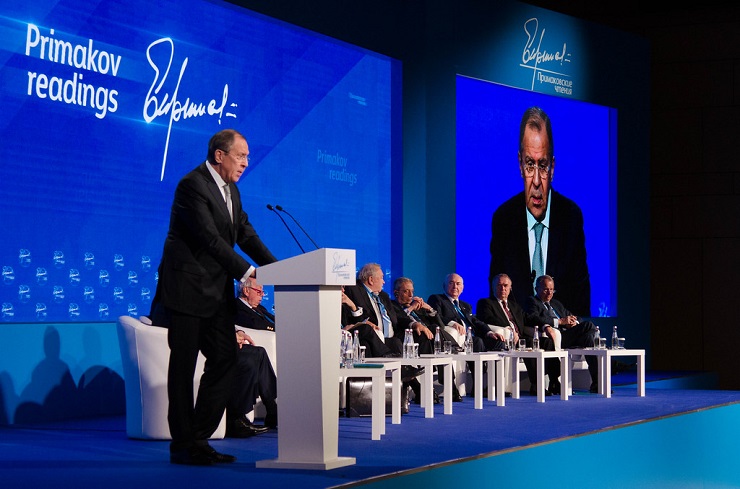The Russian foreign minister Sergey Lavrov recently made a very important speech that, unsurprisingly, received very little attention from the western media. On June 9 Mr Lavrov addressed the Primakov Readings International Forum in Moscow. In his speech, Lavrov drew attention to what he persists in calling “our western colleagues” unwillingness to accept the “objective reality” of a peaceful movement to a polycentric world.
Instead, the collective West strove to ensure the continuation of their “privileged international opinion” at all costs. The West’s unpreparedness for “an honest, facts-based dialogue” was certain to undermine trust in the very idea of dialogue as a method of settling differences “and to erode the capabilities of diplomacy as a crucial foreign policy tool”.
The main mechanism used by the West in trying to establish its point of view was in its relentless promotion of what it is pleased to call “the rules-based world order”. That is a concept, Lavrov argued, that was “even more irrational and devoid of prospects”.
The West’s concept of the rules-based world order was to be contrasted with the United Nations Charter, itself also a body of rules, but one that has been universally accepted and coordinated by all members of the international community. It is the latter that is the foundation of international law. The West, by contrast, uses the term the “rules-based world order,” by which they have in mind something completely different. The West, by its use of the rules-based world order have in mind a totally different concept. The West by its terminology, has in mind that they want to develop West centric concepts and approaches “to be later palmed off as an ideal of multilateralism and the ultimate truth.”
These ideas of the rules based order are particularly marked in Europe, the United States and Australia.
By contrast, Russia is promoting its ideas in Eurasia. Lavrov drew attention to the fact that the values the Russians promote underlie the operation of a range of international organisations that have developed, especially over the past decade. These include the Commonwealth of Independent States, the Collective Security Treaty Organisation, the Eurasian Economic Union and the Shanghai Cooperation Organisation.
These organisations can all be characterised by being associations based exclusively on the principle of “voluntary participation, equality and the common good”. One of Russia’s priorities was the strengthening of the comprehensive interaction with China. This year marked the 20th anniversary of the Treaty of Good Neighbourliness and Friendly Cooperation between Russia and China
That is a relationship the Americans would dearly love to break up. It is undoubtedly one of the principal motivations of United States president Biden’s anxious desire for a meeting with Vladimir Putin in Geneva in a little less than a week’s time. It has just been announced that Biden will be accompanied by his secretary of state Antony Blinken, undoubtedly to make sure that Biden embarrasses neither himself nor the United States. Given Biden’s uncertain mental grasp these days, him saying the wrong thing is an ever-present danger.
The Russians are relentlessly pursuing an ASEAN based policy, based on what Lavrov called the “unification philosophy”. The concept embraces all of Eurasia’s nations, and Lavrov sees it as a means of dramatically increasing the comparative advantages of all the countries in this huge region. The aforementioned organisations are an illustration of how many countries in this vast region are cooperating in their economic and social development.
Lavrov was asked a question about the forthcoming meeting with Biden. He gave a cautious response. The success or otherwise of the mission would clearly depend upon the mindset the Americans brought to the meeting. Lavrov warned that if the Americans continued to follow the footsteps of their own propaganda, which deafens the United States elite as well, then there was “not much to expect from this summit”.
This is a totally realistic view. The history of United States – Russia relations has been fraught with many problems. It is difficult to escape the view that the latest summit will offer no realistic improvement in the United States – Russia relations. The Americans clearly see the Chinese as the greatest threat to their world position and one way to tackle the Chinese issue is to try to separate them from their relationship with Russia.
In this, is in so many other things, the Americans fail to grasp the geopolitical realities of the 21st-century. They are desperately seeking to cobble together a new alliance of India, Japan, Australia and themselves. Inviting Australia to the current G7 meeting in the United Kingdom surely flatters Australia’s perception of itself as a key player in the Indo Pacific region, but to the rest of the world it is merely yet another example of Australia’s obeisance to the United States.
It is hardly likely to frighten the Chinese who could destroy Australia in less than 30 minutes should they one-day pose a serious threat to China. Even the Australian government is not so stupid as to believe it’s eventual receipt of a collection of submarines will seriously change the balance of regional power.
Australia should grass the opportunities offered by the growing number of regional organisations mentioned above as providing the key to its future prosperity. Unfortunately, the current directions of its foreign policy do nothing to encourage the belief that Australia has grassed the realities of the 21st-century political, economic and military changes.
James O’Neill, an Australian-based former Barrister at Law, exclusively for the online magazine “New Eastern Outlook”.
Related posts:
Views: 0
 RSS Feed
RSS Feed















 June 16th, 2021
June 16th, 2021  Awake Goy
Awake Goy 
 Posted in
Posted in  Tags:
Tags: 
















